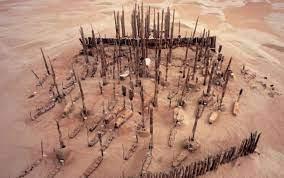Graves of Greediness
11: 4-35

We observe with sadness that the memory of the cause of the burning at Tav’erah (to see link click Bp – Complaining at Tav’erah) seems to have been lost quickly. It was followed directly by another, even more serious attack on God’s mercy in the people’s rejection of manna, the bread of heaven. It is possible that there was a considerable lapse of time between the complaining that led to the burning (11:1-3) and the complaining that led to the plague of quail (11:4-35), but the placement of these stories in abrupt linking suggests that the time lapse was insignificant. It seems that this new rebellion transpired during the next stop along the march.
There is symmetry in these narratives of rebellion in the TaNaKh. The scream for “real food” rather than the divine provision of manna takes us back to the initial complaint about food in Exodus (see the commentary on Exodus Cq – If Only We Had Died by the LORD’s Hand in Egypt), where God began to provide His people with the wonder of manna; it also carries us forward to the last rebellion about food near the end of the generation in the wilderness, where the people rejected the manna as detestable, only to be forced to focus on the image that was truly detestable, the serpent (see Di – The Healing Snake), who was their only means of escape from God’s plague.
Indeed, ADONAI’s provision of food for His people (and their common actions of ingratitude for His mercy) is one of the dominant motifs in the Bible. This began in the Garden of Eden teeming with all kinds of food (Genesis 2); eating the forbidden food led to expulsion from Paradise (Genesis 3). And the Bible ends with a great banquet (see the commentary on Revelation Fg – Blessed Are Those Invited to the Wedding Feast of the Lamb). Along the way, on the journey from the paradise of Eden to the Wedding Feast of the Lamb, the provision of food is a mark of God’s love and care for His people. He provides food for those who fear Him; He remembers His covenant forever (Psalm 111:5). But there is more to eating than food for the stomach. This is why we must bless God (Psalm 103:1-2), especially at meal times. Eating a satisfying meal provides the believer a wonderful reason to praise YHVH, who gives good gifts (Deuteronomy 8:10). Similarly, to blame God for a shortage of food, or for a lack of variety, is a cowardly act of irreverence. So, here, we learn the story of the graves of greediness in 11:4-35.180
These verses are displayed in a chiastic fashion (see Ac – Numbers from a Messianic Jewish Perspective: Chiasm and Introversion). The inverted symmetry of this section of Scripture is clear. ADONAI punishes the people’s complaint (AA) and that of Moses (BB). In c, the divine reply of condemnation to both complaints, is pivotal, anticipating the punishment. Moshe’s panicky outburst bordering on heresy, is the main point.
A. The people’s complaint: meat (11:4-9)
B. Moses’ complaint: assistance (11:10-15)
C. ADONAI’S response to both complaints (11:16-23)
a. ADONAI’s response: superficially positive (11:16-20)
c. Moses’ response: lack of faith (11:21-22)
b. ADONAI’s response: restrained (11:23)
B. ADONAI assisted Moses by authorizing the elders (11:24-30)
A. ADONAI judged the people by supplying meat (11:31-34)
From Kivrot Ha’Ta’avah the people traveled to Harzerot, and they stayed there (11:35)



Leave A Comment